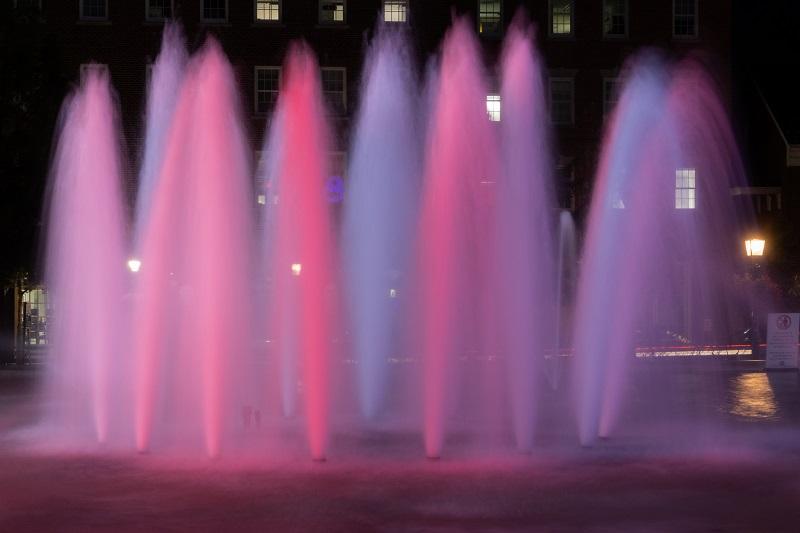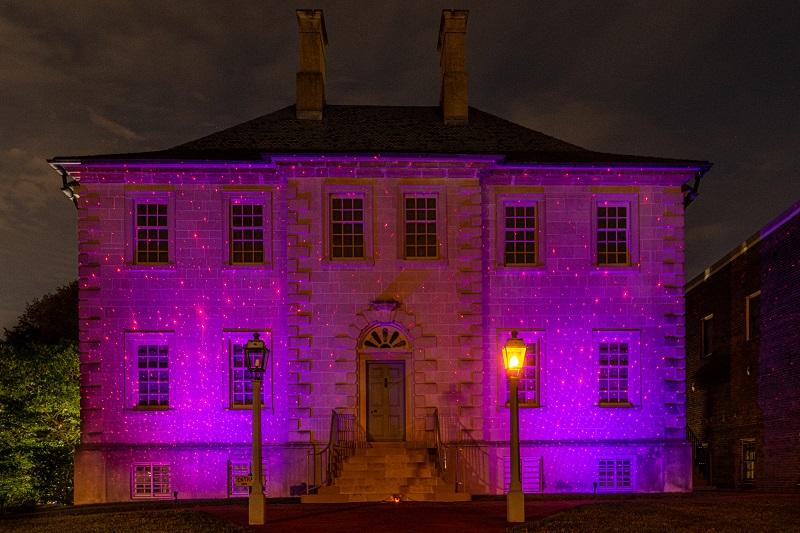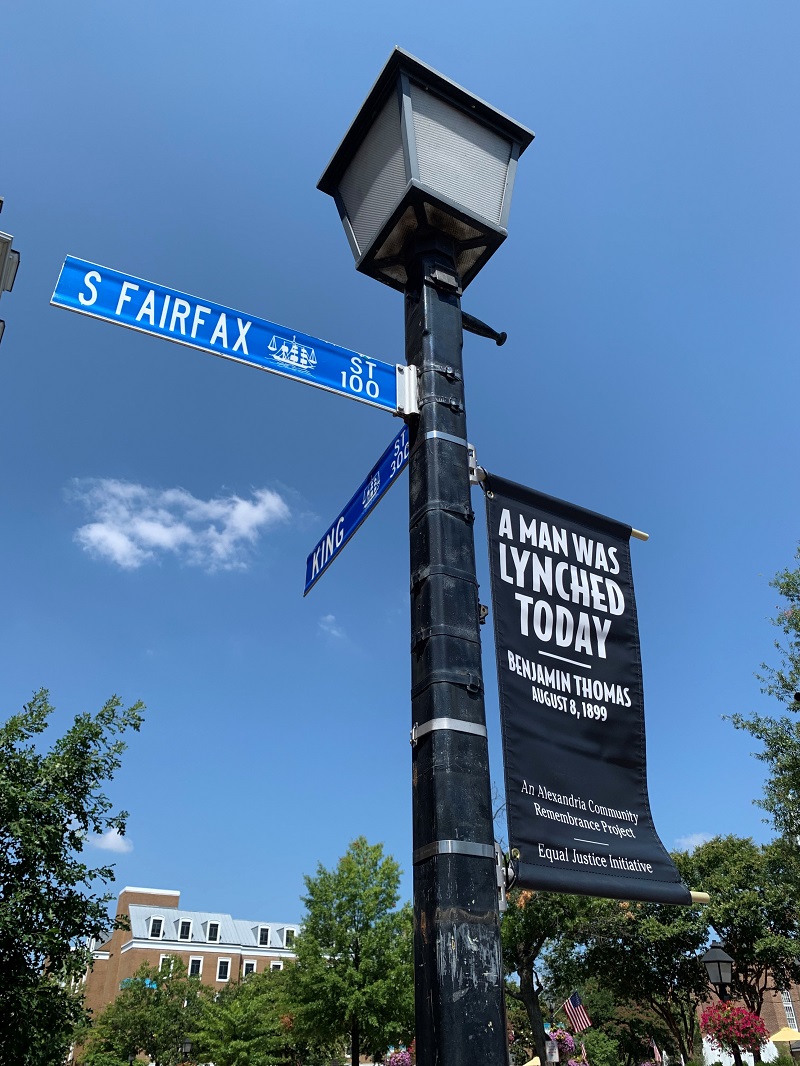
In Memoriam 2021: Benjamin Thomas August 8, 1899
In Memoriam: Benjamin Thomas August 8, 1899

The City of Alexandria is committed to the accurate dissemination of its history. The murder of Benjamin Thomas is recognized as a terrible chapter in Alexandria’s past. To fight injustice and to keep the memory of Alexandria’s lynching victims alive, you are invited to participate in the Alexandria Community Remembrance Project. As part of this community reflection, please share your thoughts, artwork, or creative writing after viewing the information on this In Memoriam page. Email your work to HistoricAlexandria@alexandriava.gov. Selections will be posted below in the digital guestbook.
The 2021 memorial includes this In Memoriam page. Also view the 2020 In Memoriam page and read the ACRP Newsletter, July 2021, for more information.
Memorial Events
Remembrance Program
August 8, 7–8 p.m., a remembrance program, wreath-laying, and marker unveiling will be held at Market Square, and the lynching site (near the corner of King and Fairfax streets) as part of the Alexandria Community Remembrance Project. Visitors can pay their respects by visiting the site and learning about the lynching. Thomas’ death was one of two documented lynchings in Alexandria. Between 1882 and 1968, 11 documented lynchings occurred in Northern Virginia and 100 occurred in the Commonwealth.
Illuminations
Throughout the weekend of August 6–9, Alexandria City Hall, Carlyle House and the George Washington Masonic Memorial will be illuminated in purple, the color of mourning. This lighting is intended to demonstrate belated accountability for the incident, while showing honor and respect for Thomas.
Lecture
August 3, at 4 p.m., Historian LaNitra M. Berger will explore how lynching photography and representations of lynching in American art provide historical information and context for racial violence in the United States. Register for this free, virtual program.
In Honor of Benjamin Thomas
Proclamation
Alexandria Mayor Justin Wilson presents a 2021 Proclamation in honor of lynching victim Benjamin Thomas who was murdered on August 8, 1899. This Proclamation acknowledges both of Alexandria ‘s lynching victims and is a formal apology from The City of Alexandria for past racial injustice.
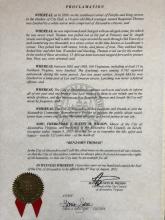
A Song and Prayer in Honor of Benjamin Thomas
Steal Away (a traditional Negro spiritual)
Minister Kabanya Vinson, Shiloh Baptist Church’s Minister of Music, sings a traditional Negro spiritual called “Steal Away,” believed to have been written around 1862. This spiritual, would have been familiar to African Americans in the 19thcentury. The piece has double meaning. The lyrics “steal away to Jesus” may have represented a plan or desire to escape the bondage of slavery. In the case of Benjamin Thomas, a wish from the congregation that in death Thomas is finally released from the torture of the murderous mob.
The definition of the phrase “Steal Away” is to exit or escape from a person, place, or thing in a hurried pace.
Some people believe or understand this song to simply be used as a song of worship or longing to be with their god. However, it has been proven that Negro Spirituals were used to relay messages among slaves in order to reach freedom.
As you begin to dive into the lyrics of the song, I would like you to imagine the time period the song was created in, who sang the songs, and what circumstances this song was sung in.
The translation provided below is a personal interpretation, and is not presented without bias. Please use the provided scholarly sources at the end of the post if translations are needed for a school or work-related project
-- Min. Kabanya Vinson
| Original Lyrics | Translation |
| Chorus
Steal away(2x) |
Chorus |
| Verse 1
My Lord he calls me |
Verse 1 |
|
Verse 2 |
Verse 2
The miracle of escape is manifesting |
A Poem for Benjamin Thomas
A Tale of Two Names: For Benjamin
© An Original Poem by KaNikki Jakarta, the First Black Poet Laureate of Alexandria, Virginia
You were Benjamin Thomas
also known as Benjamin Thompson
lynched in Alexandria, Virginia on August 8, 1899
due to a varied crime
during a time
when the newspapers didn’t care enough to print your name right
That night,
the story seems a bit blurry
between blurred lines of testimony of what really took place
Your history is traced
121 years
and still unclear
Did Lillian walk by your house or come to your door to borrow an ax?
Did she flee in an outcry after an attack?
Was she with her younger brother or was she alone?
Did Lillian indeed come to your home?
I’ve read enough black history of lynching’s and tragedies
to know that even with a testimony and blatant discrepancies…
justice would not be the outcome
Accuser’s accusations could have a black person hung
Who cares if these stories where accurate? Who cares about the truth?
when the mission of the accuser is to kill the black youth
they painted you as a horrible person,
shot you in the heart and hung you from a lamp post in an attempt to burn out your light
but there were protesters of Black people willing to fight for your life
the writers stated that when they learned of this accusation, the White community was enraged
no writings about your mind state or anything that you said while you were encage
Breaking into the jail and taking your life was a white mob’s intent
while falsehoods spread that the Black community was willing to kill White residents
There was one man named Albert Green
who was jailed when he tried to intervene
The journalist wrote that they didn’t think you would be lynched
especially since Lillian and her parents were the only witnesses
how frightening it must have been listening and wondering why
and having to sit silently with no chance to testify
I’m not sure if you were 16 or 20 in your final days
because the writers also didn’t care to verify your age
to them you were just another black boy
killed two years after they murdered Joseph McCoy
I’m certain that living in this city; Joseph’s murder was a tragedy of which you knew
and never in yourself imagination you would think this would also happen to you
Throughout the city, the Black community demanded your protection
and was willing to help in your defense
And here we are 12 decades later to hold up your name in remembrance
You didn’t deserve to die this way; leaving your mother heart broken and in grief
Unfortunately your story doesn’t leave us in utter disbelief
You deserved to be the person to create your own legacy
Yet, you are another fallen ancestor in our tragic history
We will pour libations and hold you in the light
and say your names as Thomas and Thompson in an attend to get it right
We will make people aware of injustice that was done to you
and say you lived until you were murdered and leave that to be true
These sad murder stories are a part of the city of Alexandria’s DNA
and affect what Alexandria was and continue to affect Alexandria today
We celebrate your life and create a memorial for you, Benjamin
and mourn at the loss of who you could have been
A Poem in Response to the Lynching (written in 1899)

Printed in the Colored American (Washington, D.C.), August 26, 1899, page 4. Reverend Lott was an early organizer of the Afro-American League in the District of Columbia and lived at 818 North Columbus Street. Alexandria City Directory, 1899.
“TAKE HIM OUT!”
By Reverend A. A. Lott
(Inspired by the Alexandria,, Va., Lynching)
What means this howling, hideous shout
“Take him out! Take him out!”
What can be all this noise about,
“Take him out! Take him out!”
The midnight shriek reached the sky,
All over town both far and nigh,
The sound shocks every passer by,
“Take him out! Take him out!”
Is this for crime that some one did,
That fiends should keep the secret bid,
And enter doors the laws forbid,
Crying-
“Take him out! Take him out!”
What means this running through the street,
As though upon a swift retreat,
And crying as they stamp their feet,
“Take him out! Take him out!”
Look! How they rush with furious glare,
While at the jail they wildly stare;
Shooting their pistols in the air,
Shouting-
“Take him out! Take him out!”
See! They have him in their grasp,
The rope around his neck is fast,
They drag him through the street at last,
Crying-
“Take him out! Take him out!”
The victim pleads but all in vain,
Their fury he could not restrain,
With murder stamped upon their brain,
Crying-
“Take him out! Take him out!”
Upon a lamp post now hard by,
The furious mob did swing him high,
And left him all alone to die,
Without Crying-
“Take him out! Take him out!
The blood that stained the rugged street,
Where horses tread with noisy feet,
Still cries to heaven for Justice sweet,
Upon the cryers-
“Take him out! Take him out!”
O! Land of Liberty and might,
Can Justice look on such a sight,
As on that memorable night,
When they-
Took him out! Took him out!
Eternal King! Almighty God,
Send not Thy judgment hence abroad.
Keep back Thy terrible, chastening Rod,
From those who-
Took him out! Took him out!
Say Their Names
On August 8th, the City of Alexandria remembers Benjamin Thomas, a 16-year-old Alexandrian who was lynched by a mob comprised of City residents.
We ask you to remember these 15 heroic African American men who tried to save the life of Benjamin Thomas in 1899.
Today (I / We) say the names of the following African American citizens who risked their safety to try to save the life of a 16-year-old boy from lynching.
We say their names to remember…to never forget…to know there are people who will stand on the right side of history, even at great personal cost. Today we say their names...
James Alexander
Robert Buckner
Allen Carter
Thomas Elzie
Edward Gibson
Albert Green
John Haskins
Alfred Mason
Harry McDonald
John Nelson
Edward Payne
James Turley
Richard Washington
William Washington
John Wilson
They live on in our hearts as we strive to make Alexandria a welcoming and inclusive city.
Today, we also remember Benjamin Thomas and all African Americans who died at the hands of racial terror hate mobs. We keep their memory alive in our hearts as we vow to fight against racism and injustice.
A New Historic Marker

Below is the text for the new historic marker installed at the site of the lynching, near the corner of King and Fairfax streets. Thank you to the members of the Soil and Marker Committee as well as the Research Committee for their dedicated and thoughtful work on the development of this marker and remembering the life of Benjamin Thomas.
The Lynching of Benjamin Thomas
August 8, 1899
Photo Caption: Leadbeater Corner, site of the lynching. "It is a dismantled post at the southwest corner of King and Fairfax Streets... The lamp was removed and the iron post permitted to stand when the electric lighting system was installed several years ago. On this post is a United States letter box." Times (Washington D.C.), August 10, 1899. Photo Courtesy Alexandria Special Collections Library.
Close to Midnight on Tuesday, August 8 1899, Benjamin Thomas, a 16-year-old Black Alexandrian, was lynched from a lamppost on this corner.
Earlier, white rioters attacked the City Jail on N. St. Asaph Street, where they seized and dragged Thomas for a half-mile on a cobblestone street, hitting him with bricks, iron, and stones, as he cried out for his mother. Under the shadow of City Hall and the police station, he was stabbed, kicked, shot, and hanged.
On Monday, August 7, 1899, police had arrested Thomas on the word of an eight-year-old white neighbor and charged him with assaulting her.
When Alexandria's Black community learned of Thomas' arrest, they feared another lynching. Two years earlier, a white mob murdered a local Black teenager, Joseph McCoy, based on similar allegations. Attempting to protect Thomas from such a fate, groups of Black men organized, offering their aid to police. The police and Alexandria's mayor, George Simpson, ridiculed their concerns.
Mayor Simpson stood on the steps of the jail and asked the mob to leave, saying, "Fellow citizens, if you will disperse and go away quietly, I will promise you that a court will be convened today.... If this is not done, I will give you my word, as a man of honor, that I will personally lead a mob tomorrow night to lynch Thomas...."
The police arrested many in the Black community that night and the mayor sentenced them to heavy fines or jail time. Yet, no whites were held accountable for the lynching of Benjamin Thomas.
After the brutality inflicted on Thomas, his body was taken to Demaine funeral home on King Street. His mother, Elizabeth Thomas, "could not bear to look upon her boy." At the memorial service at Shiloh Baptist Church, a crowd of 600 people heard Rev. Henry H. Warring proclaim Thomas an honest boy, innocent of the crime that led to his lynching.
After Thomas was interred at Penny Hill Cemetery, the Black community mobilized to assist the Thomas family to raise funds to move his body from a pauper's grave into Douglass Cemetery, but the relocation was not recorded. There is still a question as to the final resting place of Benjamin Thomas.
The Lynching of Benjamin Thomas: A Narrative
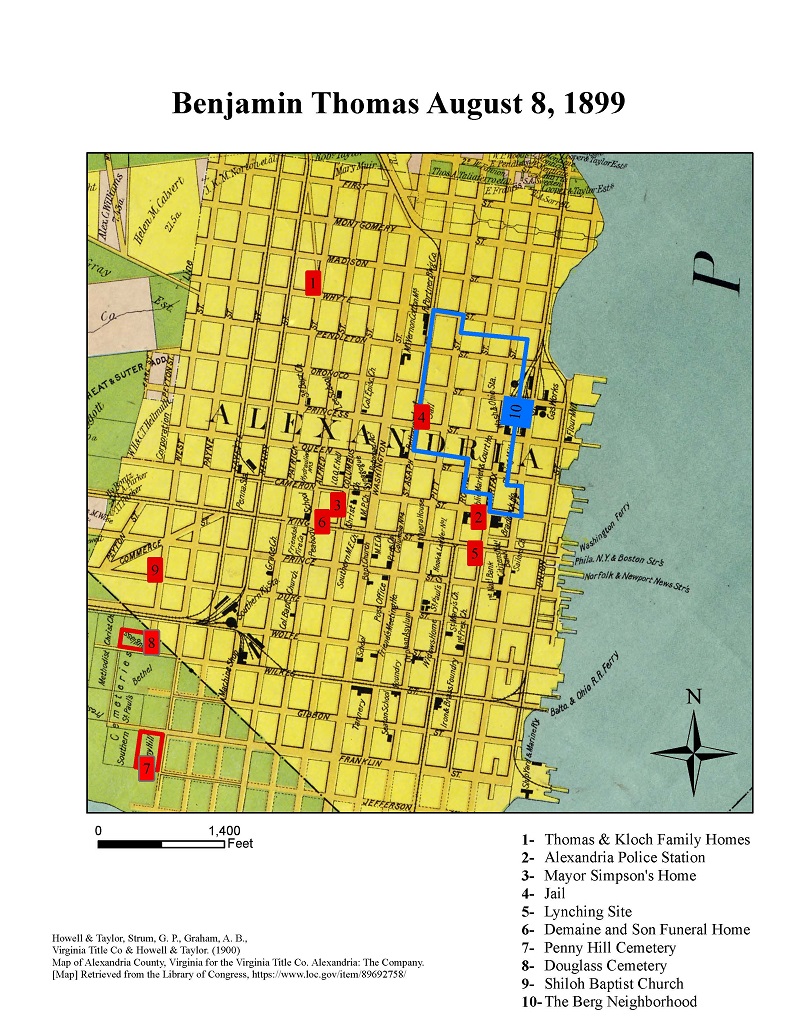
Around midnight on August 8,1899, a 16-year-old African American teenager named Benjamin Thomas was lynched in Alexandria, Virginia. A white terror mob comprised of Alexandria citizens attacked the city jail on St. Asaph Street, and Benjamin Thomas was dragged half a mile to the southwest corner of King and Fairfax streets, opposite Market Square. The full account of this hate crime was methodically researched by the 13-member Research Committee of the Alexandria Community Remembrance Project.
Location of the Events of August 8, 1899
Leadbeater Corner, site of the lynching
“It is a dismantled post at the southwest corner of King and Fairfax Streets... The lamp was removed and the iron post permitted to stand when the electric lighting system was installed several years ago. On this post is a United States letter box.” Times (Washington, D.C.), August 10, 1899, page 3. (Courtesy Alexandria Library Local History/Special Collections)
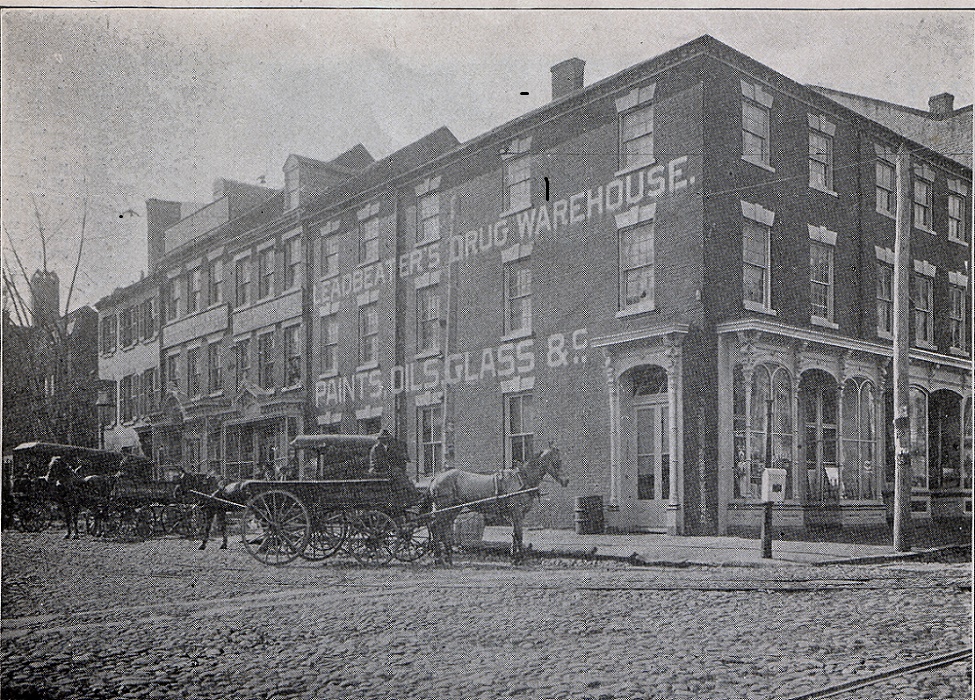
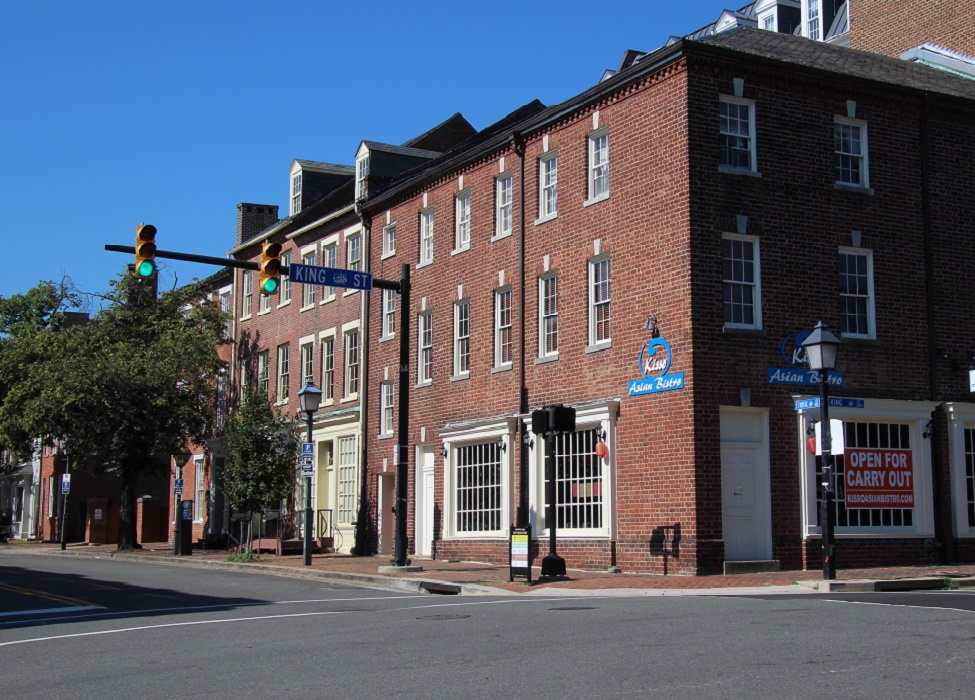
Old Alexandria Jail
Not dated but likely very early 20th century. This is the view from North St Asaph at Princess looking northeast. The façade of the jail and the jail wall remain. (Courtesy, Alexandria Library Local History/Special Collections)
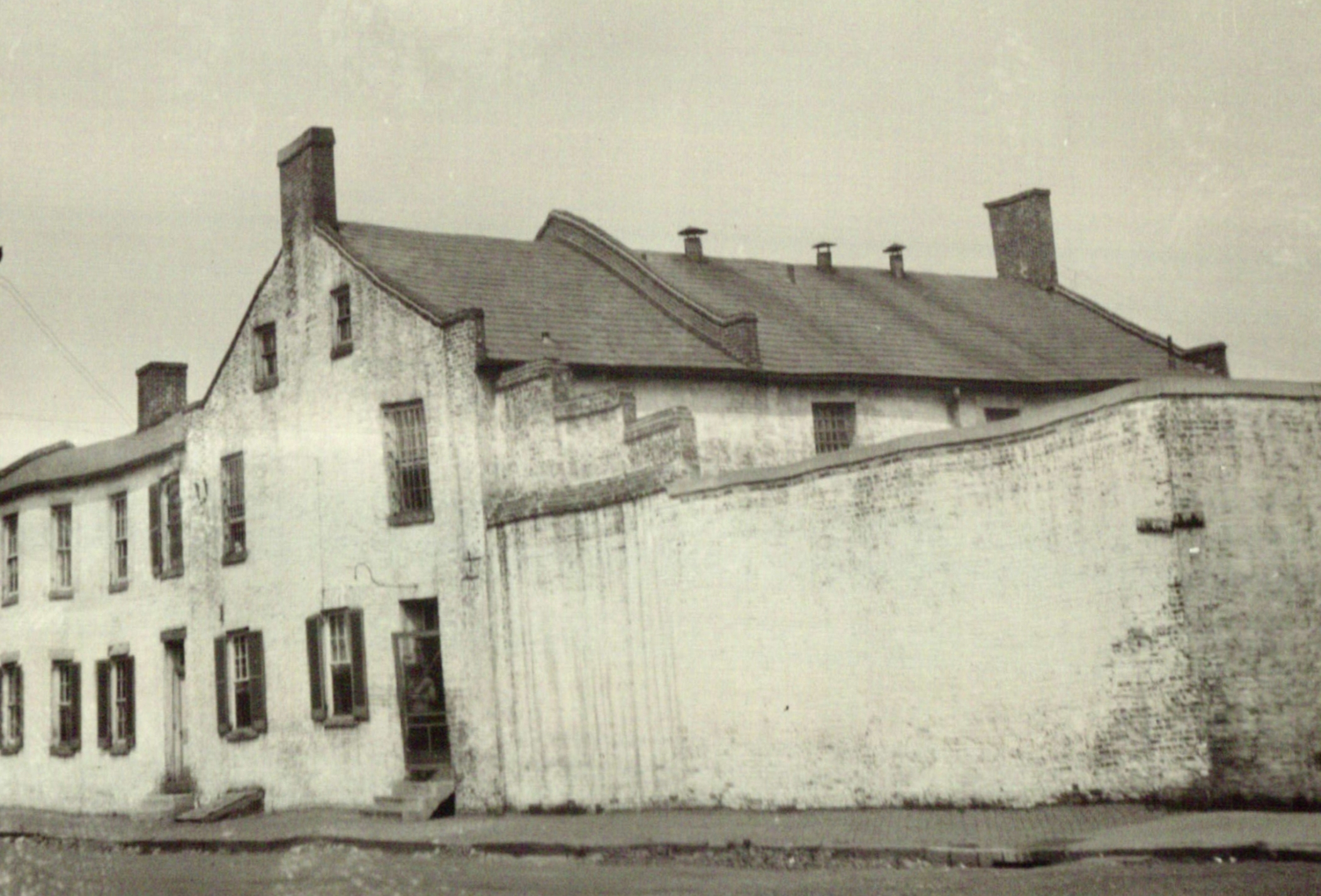
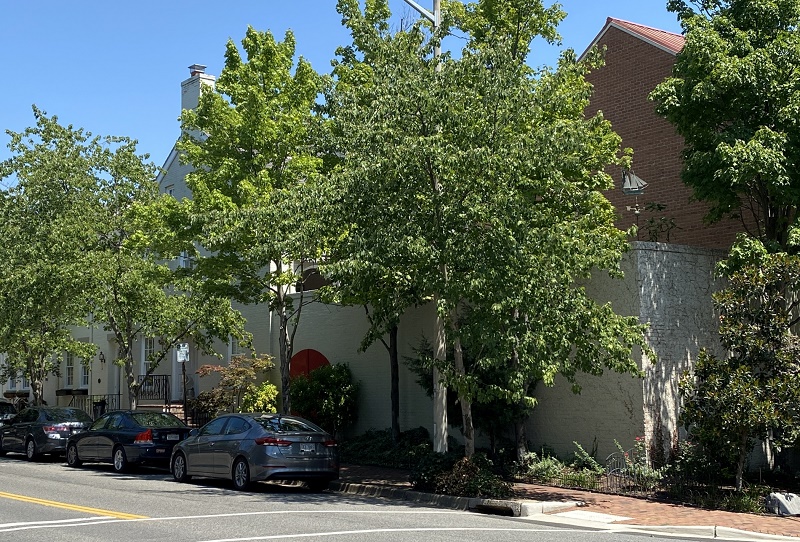
In the News
Stop to Remember Benjamin Thomas
Stop to Remember Benjamin Thomas. By Audrey Davis, Director, Alexandria Black History Museum. Opinion, Alexandria Gazette Packet, August 5, 2021.
Commemorative Broadside Dedicated to the Memory of Benjamin Thomas
Commemorative Broadside Dedicated to the Memory of Benjamin Thomas. Alexandria Times, August 5, 2021.
Benjamin Thomas and Emmett Till
Benjamin Thomas and Emmett Till. By Percy White, Gang Prevention and Intervention Coordinator, City of Alexandria. Out of the Attic, Alexandria Times, August 6, 2020; Reprinted August 5, 2021.
Historical Marker Honors Memory of Alexandria Lynching Victim Benjamin Thomas
Historical Marker Honors Memory of Alexandria Lynching Victim Benjamin Thomas. By Grace Arnold, The Zebra, August 11, 2021.
'Face Yourselves.' City dedicates marker in memory of lynching victim Benjamin Thomas
'Face Yourselves.' City dedicates marker in memory of lynching victim Benjamin Thomas. By Jeanne Theismann, Alexandria Gazette Packet, August 12, 2021.
Social Justice Reading List
About the Reading List
In honor of Benjamin Thomas, City of Alexandria Library staff have curated a list of social justice reading for adults and for youth. We hope you will find these selections educational and moving. These titles - both fiction and nonfiction - provide context for discussion of race, class, violence and American society.
Readings for Teens
- Anderson, Carol – We Are Not Yet Equal: Understanding Our Racial Divide
- Farish, Terry – The Good Braider
- Hope Perez, Ashley – Out of Darkness
- Jewel, Tiffany – This Book is Anti-Racist
- Johnson, Maureen – How I Resist
- Jones, Kimberly – I'm Not Dying with You Tonight
- Lewis, John – March series
- Magoon, Kekla – How It Went Down
- Magoon, Kekla – Light It Up
- Morris, Brittney – Slay
- Oshiro, Mark – Anger is a Gift
- Reynolds, Jason and Ibram X. Kendi – Stamped: Racism, Antiracism, and You
- Reynolds, Jayson – All American Boys
- Stone, Nic – Dear Martin
- Thomas, Angie – The Hate U Give
- Watson, Renee – Piecing Me Together
Readings for Adults
- Alexander, Michelle – The New Jim Crow: Mass Incarceration in the Age of Colorblindness
- Blackmon, Douglas – Slavery By Another Name: The Re-Enslavement of Black Americans from the Civil War to World War II
- Coates, Ta'Nehesi – Between the World and Me
- Coates, Ta'Nehesi – We Were Eight Years in Power: An American Tragedy
- Cushway, Philip – Of Poetry & Protest: From Emmitt Till to Trayvon Martin
- Cooper, Brittney – Eloquent Rage: A Black Feminist Discovers Her Superpower
- DiAngelo, Robin – White Fragility: Why It's So Hard for White People to Talk about Race
- Emdin, Christopher – For White Folks Who Teach in the 'Hood... and the Rest of Y'all Too
- Harris-Perry, Melissa – Sister Citizen: Shame, Stereotypes, and Black Women in America
- Kendall, Mikki – Hood Feminism: Notes from the Women that a Movement Forgot
- Kendi, Ibram X. – How to Be An Antiracist
- Khan-Cullors, Patrisse – When They Call You Terrorist: A Black Lives Matter Memoir
- Oluo, Ijeoma – So You Want to Talk about Race
- Cushway, Philip – Of Poetry & Protest: From Emmitt Till to Trayvon Martin
- Pinckney, Darryl – Blackballed: The Black Vote and US Democracy
- Rothstein, Richard – The Color of Law: A Forgotten History of How Our Government Segregated America
- Smith, Danez – Don't Call Us Dead
- Ward, Jessmyn – Men We Reaped: A Memoir
- Whitehead, Colson – The Nickel Boys
- Wilder, Craig – Ebony & Ivory: Race, Slavery, and the Troubled History of America's Universities
Readings for Children
- Alexander, Kwame –The Undefeated
- Anderson, Beth – Lizzie Demands a Seat! Elizabeth Jennings Fights for Streetcar Rights
- Bausum, Anne – The March Against Fear
- Bland, Bob – The Little Book of Little Activists
- Bolden, Tony – Changing the Equation: 50+ Black Women in STEM
- Braun, Eric – Protest Movements: Then and Now
- Browne, Mahogany L. – Black Girl Magic: A Poem
- Byers, Grace – I Am Enough
- Bynum, Betty K. – I'm a Pretty Little Black Girl
- Cabrera, Cozbi A. – My Hair is a Garden
- Celano, Marianne – Something Happened in Our Town: A Child's Story about Racial Injustice
- Cherry, Matthew A. – Hair Love
- Chung, Arree – Mixed: A Colorful Story
- Clark-Robinson, Monica – Let the Children March
- Colbert, Brandy – The Only Black Girls in Town
- Craft, Jerry – New Kid
- Curtis, Christopher Paul – The Watsons Go to Birmingham 1963
- Curtis, Christopher Paul – But, Not Buddy
- Digg, Taye – Chocolate Me
- Digg, Taye – Mixed Me!
- Draper, Sharon M. – Stella by Starlight
- Draper, Sharon M. – Blended
- Farrell, Mary Cronk – Standing Up Against Hate: How Black Women in the Army Helped Change WWII
- Harrison, Vashti – Little Leaders: Bold Women in Black History
- Harrison, Vashti – Little Legends: Exceptional Black Men in History
- Higginbotham, Anastasia – Not My Idea: A Book about Whiteness
- Hudson, Wade – We Rise, We Resist, We Raise Our Voices
- Johnson, Chelsea – Intersection Allies: We Make Room for All
- Kluger, Jeffrey – Raise Your Voice: 12 Protests that Shaped America
- Latham, Irene – Can I Touch Your Hair? Poems of Race, Mistakes, and Friendship
- Latour, Francie – Auntie Luce's Talking Paintings
- Lester, Julius – Let's Talk About Race
- Maldonado, Torrey – What Lane?
- Manushkin, Fran – Happy in Our Skin
- Mendez, Yamile Saied – Where Are You From
- Moyer, Naomi M. – Black Women Who Dared
- Moyle, Eunice – Be the Change: The Future Is in Your Hands
- Nyong'o, Lupita – Sulwe
- Obama, Barack – Of Thee I Sing: A Letter to My Daughters
- O'Brien, Anne Sibley – I'm New Here
- Paul, Caroline – You are Mighty: A Guide to Changing the World
- Penfold, Alexandria – All Are Welcome
- Pinkney, Andrea Davis – Let It Shine: Stories of Black Women Freedom Fighters
- Ramee, Lisa – A Good Kind of Trouble
- Ramsey, Calvin A. – Ruth and the Green Book
- Rhodes, Jewell Parker – Black Brother, Black Brother
- Rhodes, Jewell Parker – Ghost Boys
- Rippon, Jo – Rise Up! The Art of Protest
- Rogers, Amy B. – What's Racism
- Rotner, Shelley – All Kinds of People
- Saunders, Claire – The Power Book
- Shabazz, Ilyasah – Betty before X
- Taylor, Mildred D. – Roll of Thunder Hear My Cry
- Weatherford, Carole Boston – Schomburg: The Man Who Built a Library
- Williams-Garcia, Rita – One Crazy Summer
- Wilson, Jamia – Young, Gifted, and Black
- Woodson, Jacqueline – The Other Side
- Woodson, Jacqueline – Brown Girl Dreaming
- Woodson, Jacqueline – Harbor Me
- Woodson, Jacqueline – The Day You Begin
Readings Related to Teaching Children about Race, Racism, Slavery, and Racial Terror Lynching
- RES (Racial and Ethnic Socialization): Developed by the American Psychological Association, this resource focuses on building and reinforcing positive outcomes in African American children. The resources, directed towards parents, caregivers, and educators of African American children and youth (ages 5-18) may prove helpful in the museum education context.
- Engaging my Child: Towards the bottom of the parent resource page, there is a break-down of discussing race and ethnicity by the age of child.
- EmbraceRace: This non-profit describes itself as “a multiracial community of parents, teachers, experts, and other caring adults who support each other to meet the challenges that race poses to our children, families, and communities.” Scroll the webinars to listen to or read the transcripts of them—don’t miss “How Children Learn about Race” and “How to Address Racial Injustice with Young Children” in this section. Tips and recommendations related to book selection are found throughout the site.
- Teaching for Change: Building Social Justice Starting in the Classroom has a “Teaching Resources” section of its website that includes everything from overarching themes like Anti-Bias Education to specific topics like Civil Rights. The News section is incredibly helpful in keeping up with the latest happening in and adjacent to the field. The thought-piece on “When and How to Talk with Young Children about Enslavement: Discussion Questions for Educators” within News provides good questions for conversation and consideration
- Teaching Tolerance: “Let’s Talk: Discussing Race, Racism and Other Difficult Topics with Students” is one of Learning for Justice’s many helpful resources. The pamphlet focuses on facilitating difficult dialogues with student groups. It includes a self-reflection section, facilitation techniques, and suggestions for adjusting strategies for K-5 students.
- Learning for Justice's blog post: This blog post on Learning for Justice’s website includes a helpful quick reference of do’s and don’ts for teaching slavery to students.
- DC Area Educators 4 Social Justice: As we seek to connect with and meaningfully contribute to what the community is already doing, this is a great network and resource for Alexandria museum educators to be a part of.
- Talk with Children about Slavery: This resource was developed by a mom and activist who wanted to help others talk to their kids about race, social justice, and other crucial issues. Her blog links to a lot of other resources beyond her own.
- Smithsonian Magazine, Indigenous Peoples’ Day: A useful article with links to additional resources as we rethink programming around what was Columbus Day and is now recognized as Indigenous Peoples’ Day in Alexandria.
- Understanding Race: The American Anthropological Association Race Project website features a family guide for discussing race with children.
Photo Gallery
These photos were taken of the Lynching Remembrance, August 8, 2021. See a recording of the remembrance ceremony, above.
Photo credit, Jeff Hancock Photography
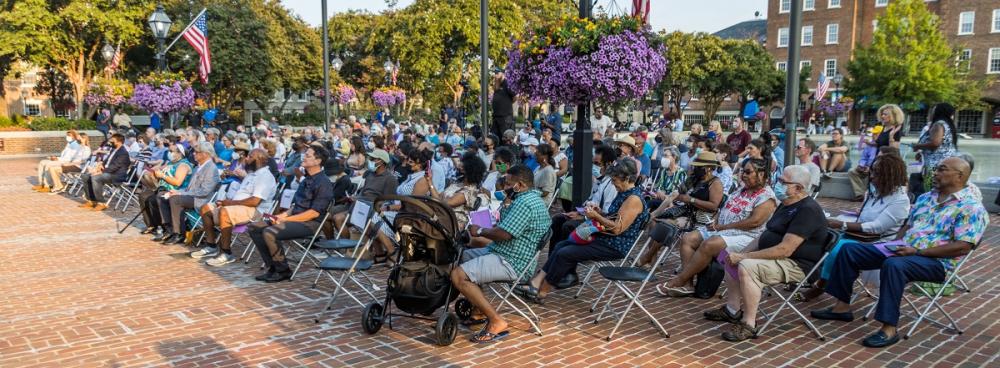
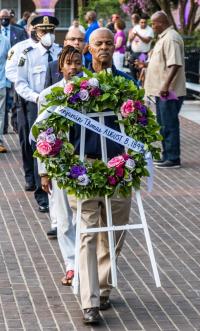
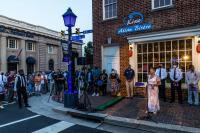
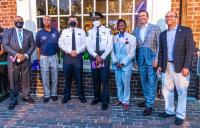
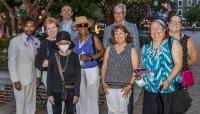
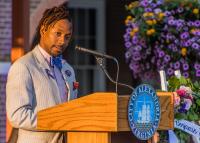
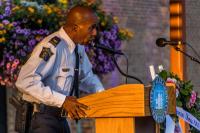
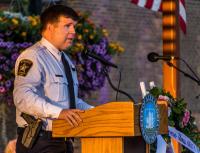
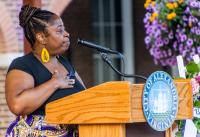

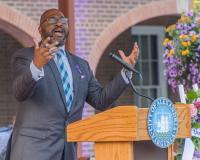
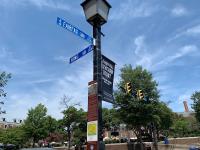
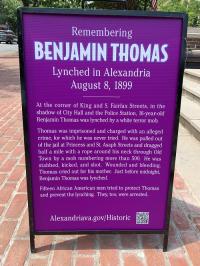

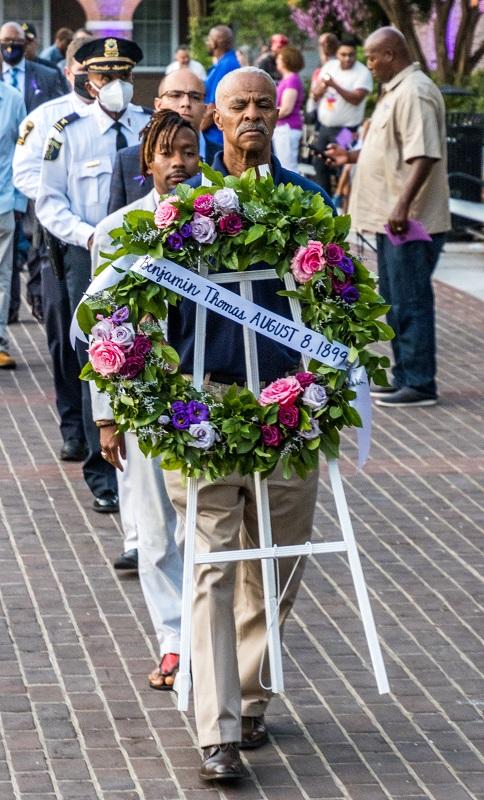
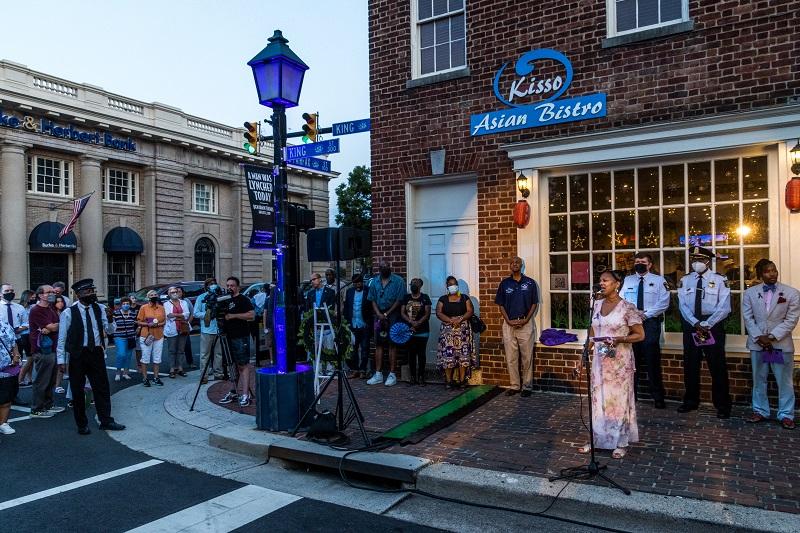
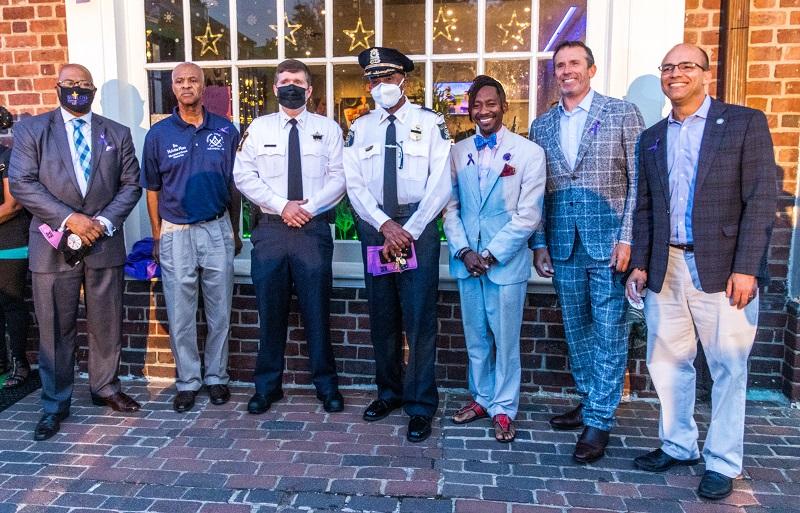
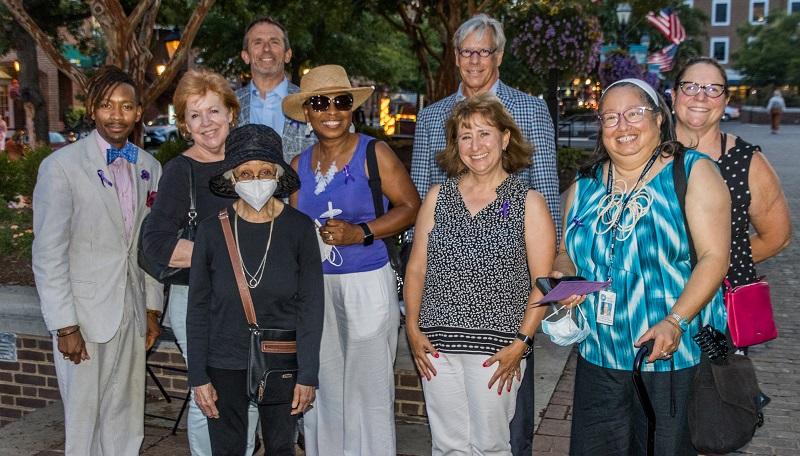
(Not pictured: Amy Bertsch, Lynn Eiseman, Darrlynn Franklin, Linda Howard, Michael Johnson, Marc Lavarin, McArthur Myers, Tiffany Pache, Cheryl Robinson, and Percy White.)
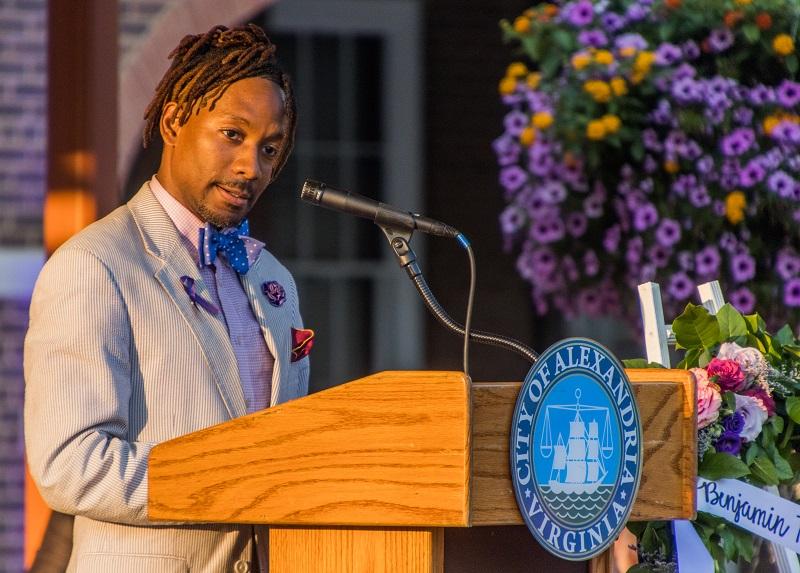
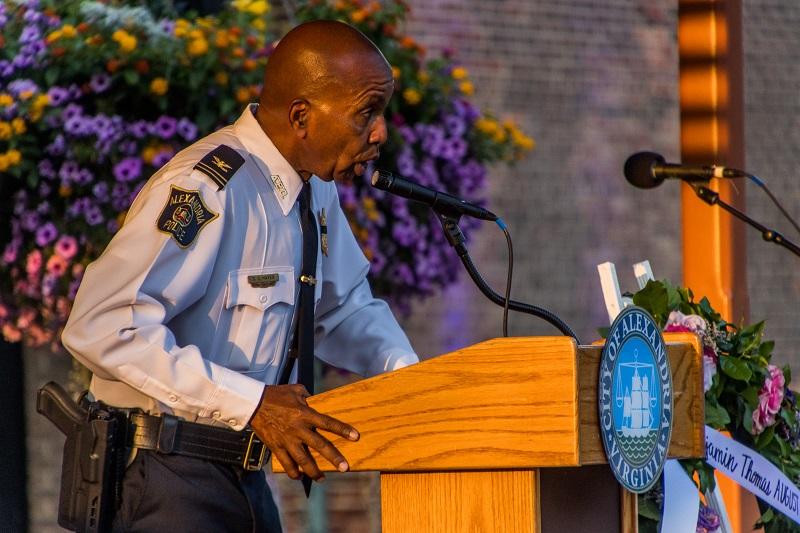
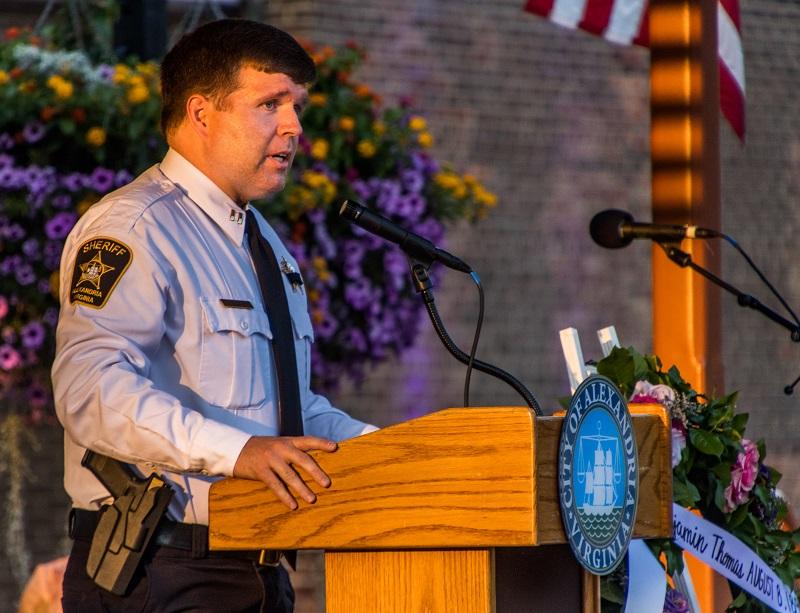
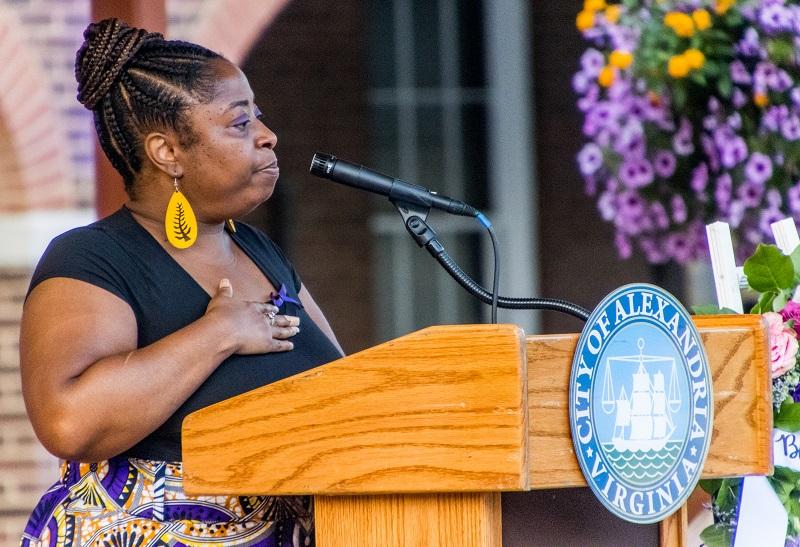
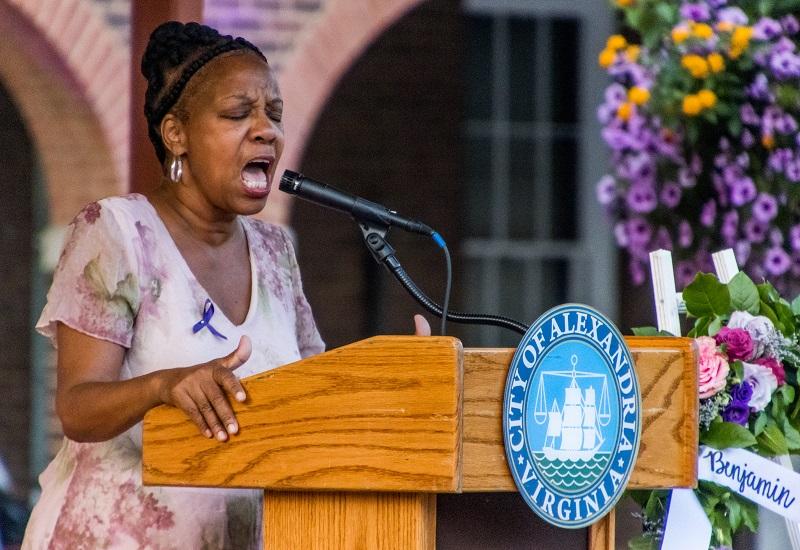
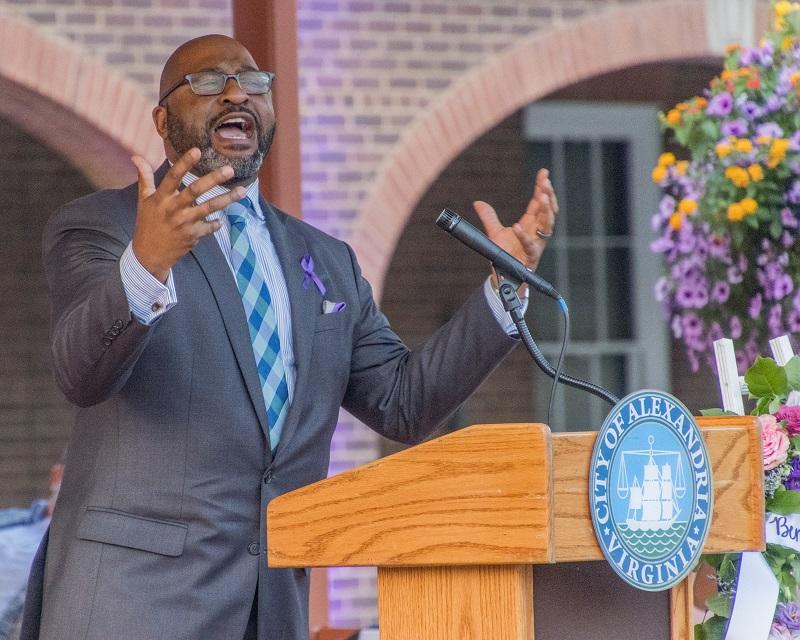
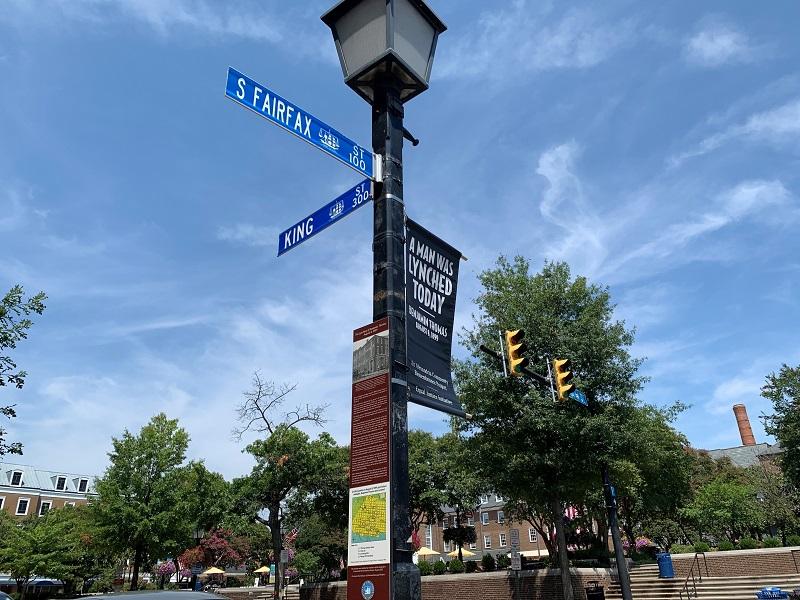
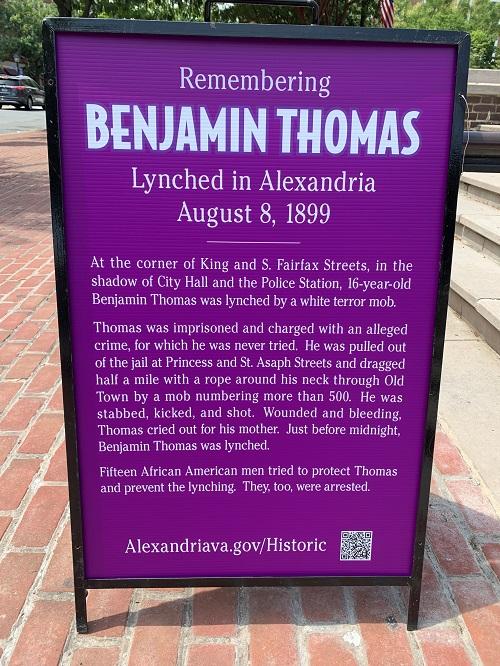
Remembering Benjamin Thomas
Lynched in Alexandria
August 8, 1899
At the corner of King and S. Fairfax Streets, in the shadow of City Hall and the Police Station, 16-year-old Benjamin Thomas was lynched by a white terror mob.
Thomas was imprisoned and charged with an alleged crime, for which he was never tried. He was pulled out of the jail at Princess and St. Asaph Streets and dragged half a mile with a rope around his neck through Old Town by a mob numbering more than 500. He was stabbed, kicked, and shot. Wounded and bleeding, Thomas cried out for his mother. Just before midnight, Benjamin Thomas was lynched.
Fifteen African American men tried to protect Thomas and prevent the lynching. They, too, were arrested.
From August 6-9, 2021, Alexandria City Hall and the Carlyle House (shown here) and the George Washington Masonic Memorial are illuminated in purple, the color of morning.
Photo credit, Jeff Hancock Photography.
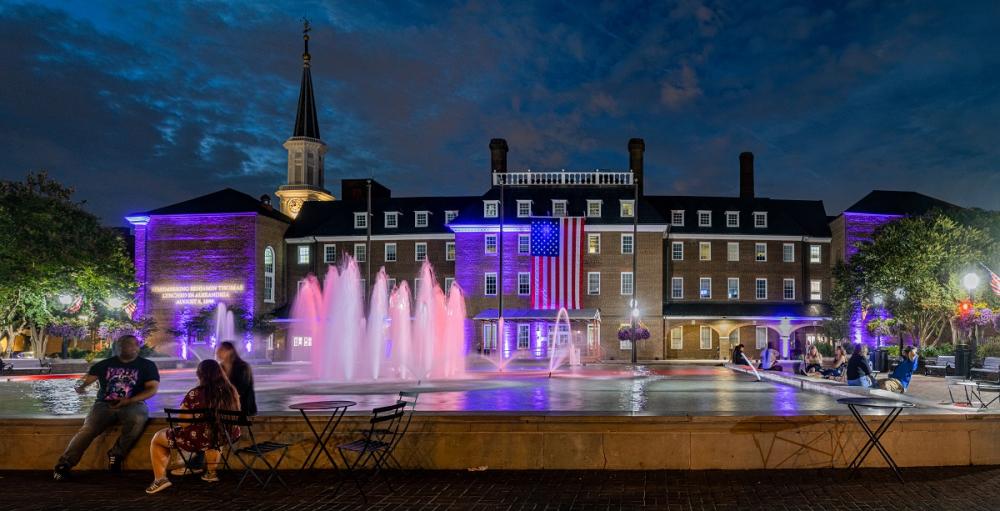



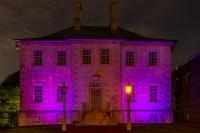

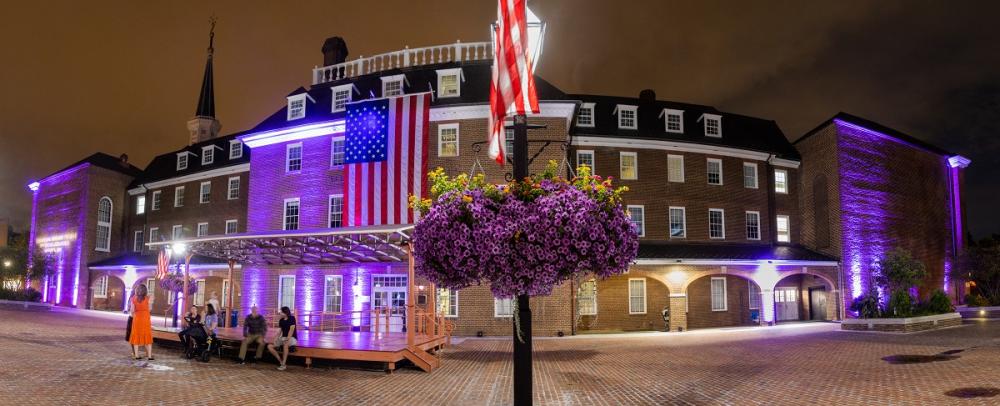
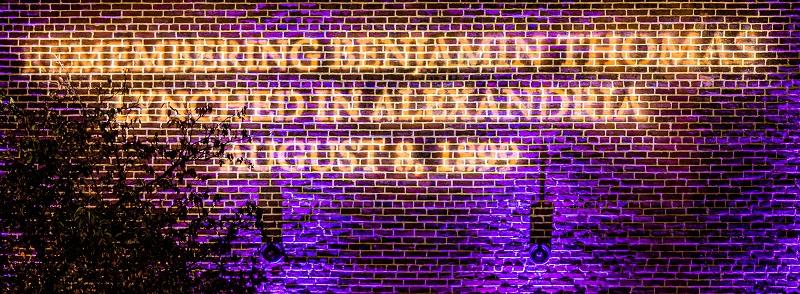
Remembering Benjamin Thomas
Lynched in Alexandria
August 8, 1899
